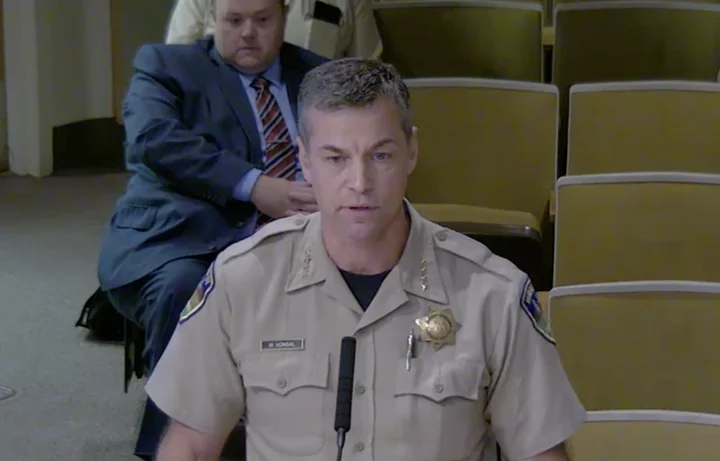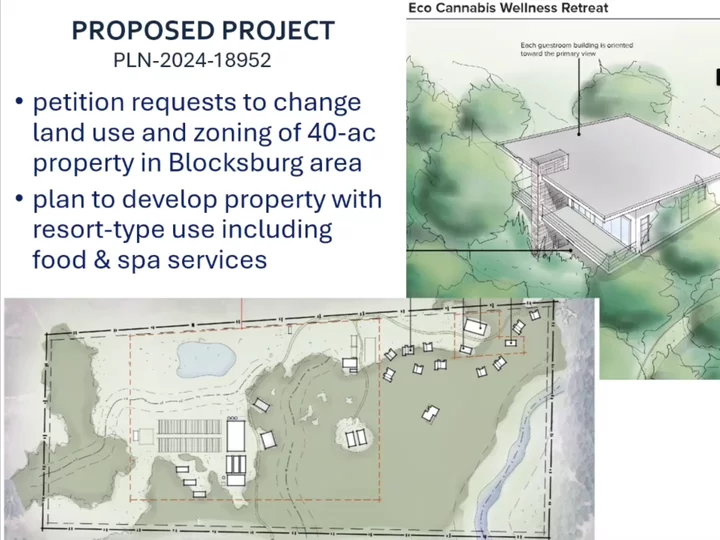Humboldt County Sheriff William Honsal. | Screenshot.
###
This afternoon, as the Humboldt County Board of Supervisors considered its responses to the latest batch of Civil Grand Jury reports, Sheriff William Honsal argued vehemently against the idea of establishing new independent oversight of his office.
In its first report of the year, the Civil Grand Jury recommended that the county set up an independent Civilian Oversight Board and an Office of Inspector General, both with subpoena power, to provide enhanced understanding and oversight of the Humboldt County Sheriff Office. The oversight board would be charged with reviewing the office’s handling of critical incidents and allegations of misconduct, so that “the people of Humboldt County can gain a clearer view of important events that affect all of us,” as the Grand Jury put it in a press release.
But in comments to the board, Honsal argued that there’s no need for such additional oversight given his office’s existing level of transparency and the measures already in place to handle allegations of misconduct.
“When I look at this report and when I look at the climate within the county, I don’t see the controversy,” Honsal said. “I don’t see the need to establish a sheriff’s oversight. … What I’m asking is, what aren’t we currently doing right now? What is it that the Sheriff’s Office isn’t being transparent about?”
Elaborating on a statement posted yesterday to the Sheriff’s Office’s Facebook page, Honsal said he has personally ensured since being elected that things in his office are done correctly and transparently, adding that if he were to do anything wrong, he would be held accountable at the ballot box.
Honsal also said that allegations of serious misconduct can be investigated by existing bodies, including the California Commission on Peace Officers Standards and Training (POST), the Department of Justice, the District Attorney, the Board of Supervisors, the Human Rights Commission, the Grand Jury and the public.
Resuming a conversation it started three weeks ago, the board (minus Supervisor Steve Madrone, who was absent) wasn’t prepared to establish such oversight at today’s meeting. Instead, they were considering whether to establish an ad hoc committee to investigate the merits of such a decision.
Fourth District Supervisor Natalie Arroyo said she sees value in exploring community opinions and researching what other counties and cities are doing in this regard. She also said the board has a responsibility to “understand the execution of duties of our employees,” telling Honsal that while the concept of an oversight board may sound punitive, that’s not her intent.
“We’re living in a domain where people expect different things from law enforcement than they did 10 or 20 years ago, and I think it behooves us to have the opportunity to set up an ad hoc and talk about that, and to bring back a little bit more information,” Arroyo said.
Third District Supervisor Mike Wilson said an oversight committee could help the community gain trust and understanding by peeling back some layers of potentially daunting bureaucracy between them and the Sheriff’s Office. He also pushed back on the notion that voters can easily hold a sheriff accountable, noting the strict requirements to run for the office and the regularity with which Honsal runs unopposed.
While Madrone was absent, he called in during this discussion to voice his interest in serving on the ad hoc committee and his support for the creation of an oversight board. He said there have been “numerous critical incidents that should have been reviewed and were not,” adding that community oversight is about the entire department, not the individual at its head.
First District Supervisor Rex Bohn, who keeps a “Thin Blue Line” flag hanging in his window, said he supports the sheriff and his deputies and agrees with Honsal that there are ample existing means of accountability.
Second District Supervisor Michelle Bushnell expressed interest in serving on the ad hoc committee, as did Arroyo.
During the public comment period, a couple of members of this last Civil Grand Jury clarified their arguments, with Larry Giventer reiterating the position that oversight is constructive, not punitive. And former foreperson Richard Bergstresser pointed to the example of the City of Eureka’s Citizen Oversight of Police Practices (COPP) board, saying, “Sunshine is always good.”
The board wound up voting unanimously to create an ad hoc committee of Arroyo and Bushnell, who will work collaboratively with Honsal, District Attorney Stacey Eads and a representative from the County Administrative Office to explore the Grand Jury’s recommendations.
Other Grand Jury responses
Earlier in the meeting, Public Information Specialist Catarina Gallardo ran through staff’s proposed responses to two other reports from the 2023-24 Civil Grand Jury: “Humboldt County Facilities: Owning vs. Leasing” and “Humboldt County Custody & Corrections Facilities.”
Regarding the prior one, Gallardo said staff agrees with the Civil Grand Jury’s central finding that it would be more cost effective if the county owned buildings rather than leasing them, though she said the county has already completed a variety of consolidation goals and is working steadily toward further co-location of county offices.
As for the second report, most of the facilities in question fall under the authority of Sheriff Honsal, who prepared his own set of responses. The Civil Grand Jury found that the county’s custody and corrections facilities all suffer from understaffing, and some have deferred maintenance needs.
Staff recommended that the board partially agree with a finding that a gap in pay is making it harder for the county to recruit juvenile corrections officers, since the board recently approved a pay raise that narrowed that gap. Staff said the board should disagree with a finding that the Coroner’s Office lacks a central computerized data system, because it has such a system. And Gallardo said the board should not implement some recommended repair projects since the Sheriff’s Office is taking care of them.
The board unanimously approved staff recommendations.
Hemp legislation letter
Turns out you can get high on hemp. This traditionally less-potent incarnation of the cannabis plant — often used in the production of paper, clothing and food products (hemp milk, hemp oil, hemp protein powder, etc.) — enjoys less-stringent regulations under federal law. In fact, the 2018 Farm Bill made it federally legal to grow hemp and ship it across state lines or even internationally, as long as it contained less than 0.3 percent THC.
But a loophole in the Farm Bill allows THC levels in hemp to be measured by weight instead of its power to intoxicate. Consequently, there has been “a flood of intoxicating hemp products” in gas stations and online stores, “making it incredibly easy for consumers and youth to access,” according to a county staff report.
There’s now a bill advancing through the state legislature, AB 2223, that would crack down on such sales through new regulations, but Humboldt County Planning and Building Director John Ford said there are significant local concerns about the proposed new law.
By co-regulating hemp alongside cannabis, the bill would allow hemp to enter the state’s legal weed marketplace, putting hemp products grown in and imported from across the country in direct competition with Humboldt-grown cannabis, which is subject to much more stringent regulations.
Staff asked the board to sign a letter opposing the bill unless it’s amended to do the following three things:
- Include a ban on incorporating all forms of hemp-derived THC into cannabis products;
- Establish a maximum THC threshold for hemp products at non-intoxicating levels; and
- Establish a clear statutory definition for synthetically derived cannabinoids.
The timeline is incredibly short: AB 2223 could pass from the Assembly to the Senate for approval as soon as Thursday, and if the Senate votes to approve it before the end of the current legislative session on Aug. 30, the measure would head to Gov. Gavin Newsom’s desk to be signed into law.
Public commenters said this is cause for serious alarm.
“There’s a few things that get my hands sweaty and my heart racing, and when the governor can just make one swoop of his pen and literally destroy everything we have built here, it is really, really concerning,” said Craig Johnson, co-owner of Alpenglow Farms.
Ross Gordon, policy director with the Humboldt County Growers Alliance, said allowing out-of-state hemp to be sold in California dispensaries would upend the marketplace. He complimented staff on the draft letter.
Ford said other counties, including Mendocino County and Nevada County, are also giving this bill the side-eye and will likely send similar letters.
The Board of Supervisors approved the letter unanimously.
###
Twinkle Acres glamping permit denied
Conceptual drawings for a proposed eco-cannabis wellness retreat. | Screenshot from county staff presentation.
###
During the board’s morning session they considered an application from commercial cannabis farmers with a 70-acre parcel near Blocksburg. They’re looking to establish a weed wellness retreat where guests would stay in casitas and enjoy accommodations such as an onsite pool, restaurant, spa, creative studios, sand volleyball court and more.
The owners filed a petition for a General Plan Amendment and Zone Reclassification to allow these uses, but Senior Planner Steve Lazar explained that the county’s current General Plan doesn’t really allow for the “spot zoning” that would be required to approve the project.
He added that the proposal conflicts with county policies designed to prevent lands zoned Agriculture Exclusive (AE) from being converted to non-agricultural uses. But county staff sees the value in this kind of proposal, which could draw tourists to the region.
“We’re asking you to both deny this petition but also direct our department to begin work on ordinance revisions to the zoning regulations to enable uses of this sort in certain scenarios,” Lazar said.
While he was in the midst of his staff presentation, Bushnell noted that the project site looked very close to her own property. The board took a break to investigate, and when they resumed the meeting a few minutes later, Bushnell confirmed that her parcel shares a boundary with this one, so she had to recuse herself.
Wilson voiced concerns about approving such development in a high-risk wildfire zone that doesn’t fall within an existing fire protection district. Arroyo agreed, saying that while this is “a really cool concept,” she understands why there are concerns.
Bohn said he thinks the fire danger could be mitigated through project requirements, and projects like this one could “show off our area.”
Property owner Paul Mitchell said he’s been talking to county staff about the potential to expand hospitality services on his land “given the climate of the cannabis industry right now.
“I think, in this community, that’s what makes the cannabis experience so unique, is the landscape, and it offers an experience that nobody else can really offer, except for southern Humboldt,” Mitchell said.
Industry representatives, including Natalynne DeLapp of the Humboldt County Growers Alliance, urged the board to have staff develop policies to allow such glamping.
“It is really a potential boon for our rural areas that are not currently supported by the farm stay model,” DeLapp said.
The three board members who were present and eligible to vote unanimously approved staff’s recommendations, denying the petition while directing staff to start working on an ordinance addressing rural visitor-serving uses and glamping by the end of June 2025.


CLICK TO MANAGE